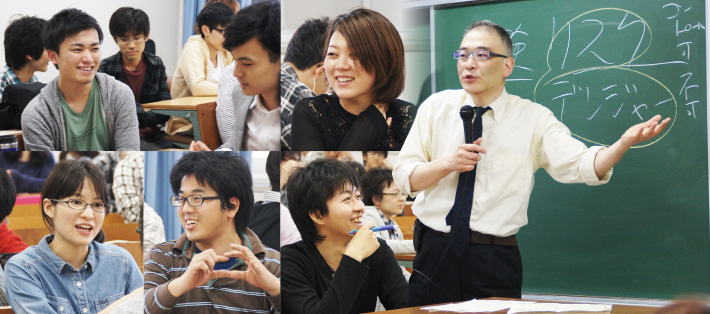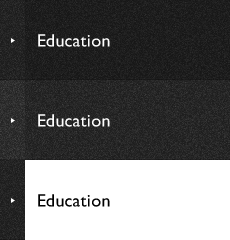Tokyo Tech was ranked 14th in the world and No. 1 by a long shot in Japan for producing employable graduates according to an article about an employability survey published in The New York Times in 2012, "What the job market wants." The exceptional talent of Tokyo Tech students is highly recognized internationally. What makes them stand out?
Tokyo Tech's long-term goal is to become one of the world's best sci-tech universities. In terms of gaining a professional competitive edge, what are the advantages of studying at Tokyo Tech? Professor Ryuta Masuzawa of the Innovator and Inventor Development Platform (IIDP) spoke about Tokyo Tech's career support services and the advantages Tokyo Tech students have.
Tell us about the employment situation of Tokyo Tech graduates.
The employment prospects of Tokyo Tech students can be summarized as follows:
-
Approximately 90 percent of undergraduate students go on to a master's program.
-
Approximately 80 percent of master's graduates commence employment.
-
Tokyo Tech is a target school for many of the major companies in Japan.
-
Most major manufacturing companies employ Tokyo Tech graduates, proving the strong bond between the Institute and industry.
The career options of Tokyo Tech students are vastly different from those of liberal arts students. As with sci-tech students of other national universities in Japan, the majority of Tokyo Tech students go on to a master's or a doctoral program and receive research-oriented education. The Institute offers tailored career support to students on the basis of current employment outlook for the sci-tech industry. As a result, Tokyo Tech has consistently ranked as one of the top sci-tech universities in employability rankings by various Japanese media publications, and in 2014, it was ranked No. 1 in a ranking published by DAIGAKUTSUSHIN Corporation, which surveyed the top 400 companies in Japan.
What kind of support is offered?
Tokyo Tech has a long history of providing solid career guidance to its students. Faculty members support their students in gaining employment in their specialized fields, and academic supervisors provide personalized career guidance along with research guidance to their lab students.
In addition, the IIDP is here to offer support to meet the various career goals of students by providing information about advanced degrees and employment opportunities. We also hold highly practical and unique career development seminars designed specifically for Tokyo Tech students.
What are the strengths of the IIDP's career support?
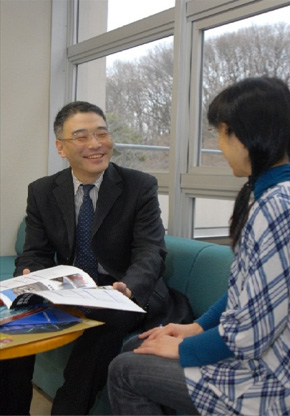
Individual Counseling
The IIDP provides unparalleled career support to Tokyo Tech students by making the most of the know-how accumulated over the years.
It has a solid personal counseling system administered by full-time career advisors who understand the employment prospects of Tokyo Tech students.
Tokyo Tech's career support services focus on giving guidance to students as to how to think about their career paths rather than offering classes on business etiquette or obtaining qualifications.
The IIDP has been following the employment situation of Tokyo Tech graduates along with changes in the economic climate from the period of economic growth around 2006 followed by the Great Recession in 2008 to the present period of economic recovery when companies are scrambling to hire Tokyo Tech graduates again.
The IIDP has a well-developed career support system and offers high-quality services in order to foster future leaders in the field of science and technology.
Career advisors at the IIDP's Career Advisors' Room counsel students individually on job-hunting strategies and pursuing advanced degrees to support their career development (some advisors also provide counseling in English).
The IIDP also holds an information-sharing event in cooperation with the Tokyo Tech Alumni Association.
Nearly 200 companies participate in the event to share information with Tokyo Tech students about current employment opportunities.
Do these events make it easier for students to get jobs?
Tokyo Tech graduates are sought by companies and society due to their expertise and excellent leadership skills. The advanced research and training that take place in the labs at Tokyo Tech lead to research activities that benefit society. Of course, conducting research per se will not land you the job you want. However, students who devote themselves to research tend to receive more job offers from major Japanese companies and highly-competitive companies than distracted students who participate in job search sessions or job fairs during their first year in a bachelor's or master's program.
From the perspective of personnel management, having good research skills is equivalent to having good problem-solving skills, which is expected of productive workers. Due to their ability to produce results, Tokyo Tech students are recognized as having high competence. The Institute's prestigious brand gives its graduates a competitive edge, but this applies especially to those who have produced research results as students.
What do you think is important for the career development of Tokyo Tech Students?
Since I had no previous affiliation with Tokyo Tech, I think I can assess the advantages of Tokyo Tech students more objectively than the students themselves or the academic supervisors, many of whom are graduates of the Institute. Students must be able to effectively communicate their exceptional skills since if they cannot get through to people, their skills cannot benefit them. Therefore, enhancing communication skills is essential for students.
What do you do to enhance the students' communication skills?
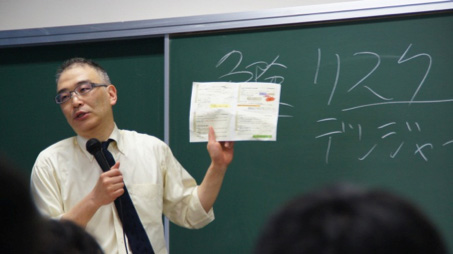
Professor Masuzawa giving a lecture
I give practical lessons in my class through methods adopted by companies for employee training such as role playing and conducting presentation activities. The class targets students who are not comfortable with speaking or communicating, so I use materials familiar to the students. Many students have attended the course and actively participated in role playing.
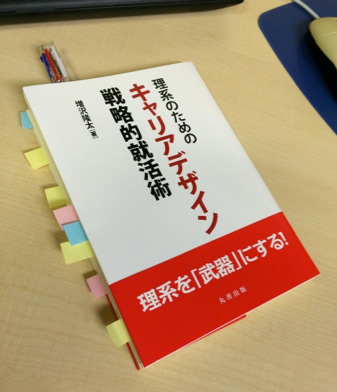
Career planning textbook
tailored to sci-tech students
What I have been teaching students is the idea that communication is not about speaking well but a means to achieve objectives.
Being able to speak well is only half the battle. Comprehensive communication skills can only be developed by training listening skills as well.
There are many classes on giving good presentations, but my class focuses on developing listening skills.
Active listening exercises
in a Career Development Course called Strategic Communication
One afternoon in the Suzukakedai Campus, Professor Masuzawa gave a lecture in a room full of graduate students.
Following the lecture, students sat face to face in pairs for active listening exercises.
One member of each pair played the role of a speaker and the other played the role of a listener.
Each speaker gave a one-minute speech to the listener on a topic of their choice.
- Exercise 1:The listeners were required to maintain eye contact with the speakers,
but they were not allowed to nod, ask questions, or react to what the speakers said in any way. After one minute, they switched roles.
- Exercise 2:The listeners were required to maintain eye contact
with the speakers just as in Exercise 1, but this time, they could repeat what the speakers said.
The listeners were still not allowed to ask any questions.
Tokyo Tech students are often said to be shy, but they immediately became engaging as the exercises began.
The speakers tried hard to communicate with the listeners as they struggled with the listeners' unresponsiveness in exercise 1,
but they seemed to be encouraged by the response of the listeners in exercise 2.
After completing the exercises, a student commented as follows:
"In exercise 1, it was difficult to speak to the unresponsive listener.
I felt uncomfortable because I was not sure whether the listener was actually listening to me."
"In exercise 2, I was glad because the listener responded to me. I felt comfortable while speaking."
The importance of having good listening skills can only be appreciated if you can put yourself in the shoes of the speaker.
Listening is an important communication skill that can be applied both in the lab and in the workplace.
I hope students in my class learn that being a good listener is the first step in developing their careers.
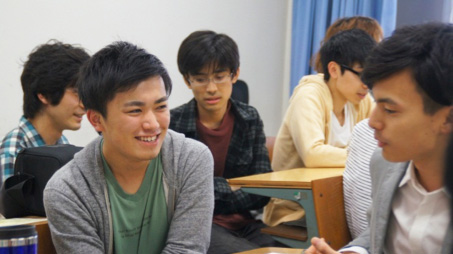
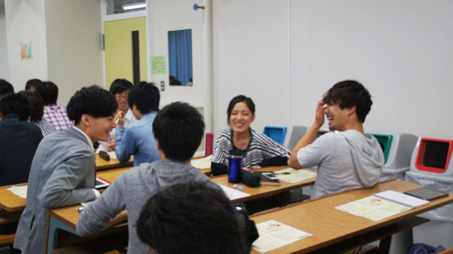
Students participating in the class
Have the communication skills of Tokyo Tech students improved?
I recently had a chance to witness my students apply their communication skills. It was during a seminar held at Tokyo Tech where guest speakers from various companies talked about employment opportunities for sci-tech students. Right as the question and answer session began, five students immediately raised their hands out of about 30 students who were attending. The students who raised their hands were all students who had taken my Strategic Communication and Doctoral Career Design courses. I always teach my students basic communication strategies such as making sure to raise their hands during question and answer sessions, and listening to the speakers while thinking about questions to ask. My students actually applied what they learned in my classes. I was so impressed when a guest speaker mentioned that responsive students like them were hard to find even at liberal arts universities where students tend to be more engaging.
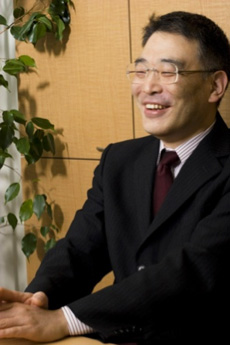
Ryuta Masuzawa
Professor Masuzawa delivers lectures to Tokyo Tech graduate students in Career Development Courses,
which include Logical Communication, Doctoral Career Design I and II, and Strategic Communication.
His recent book is "Enhance Your Communication Skills with Strategic Thinking" published by Shodensha (available only in Japanese).
Profile
| 2013 |
Professor and Chief Coordinator, Innovator and Inventor Development Platform (IIDP),
Tokyo Institute of Technology
Off-Campus Coordinator, Academy for Global Leadership (AGL),
Tokyo Institute of Technology
|
| 2009 |
Career Advisor and Coordinator, Productive Leader Incubation Platform (PLIP), Tokyo Institute of Technology |
| 2006 |
Career Advisor, Tokyo Institute of Technology |
| 2005 |
President, RM London Partners |
| 1995 |
Master of Arts, Department of History, Royal Holloway, University of London |
| 1962 |
Born in Tokyo |
The Special Topics component of the Tokyo Tech Website shines a spotlight on recent developments in research and education, achievements of its community members, and special events and news from the Institute.
Past features can be viewed in the Special Topics Gallery.
Published: September 2014
. Any information published on this site will be valid in relation to Science Tokyo.


